
catalog
AI tools catalog by AIA Podcast
Stars: 108
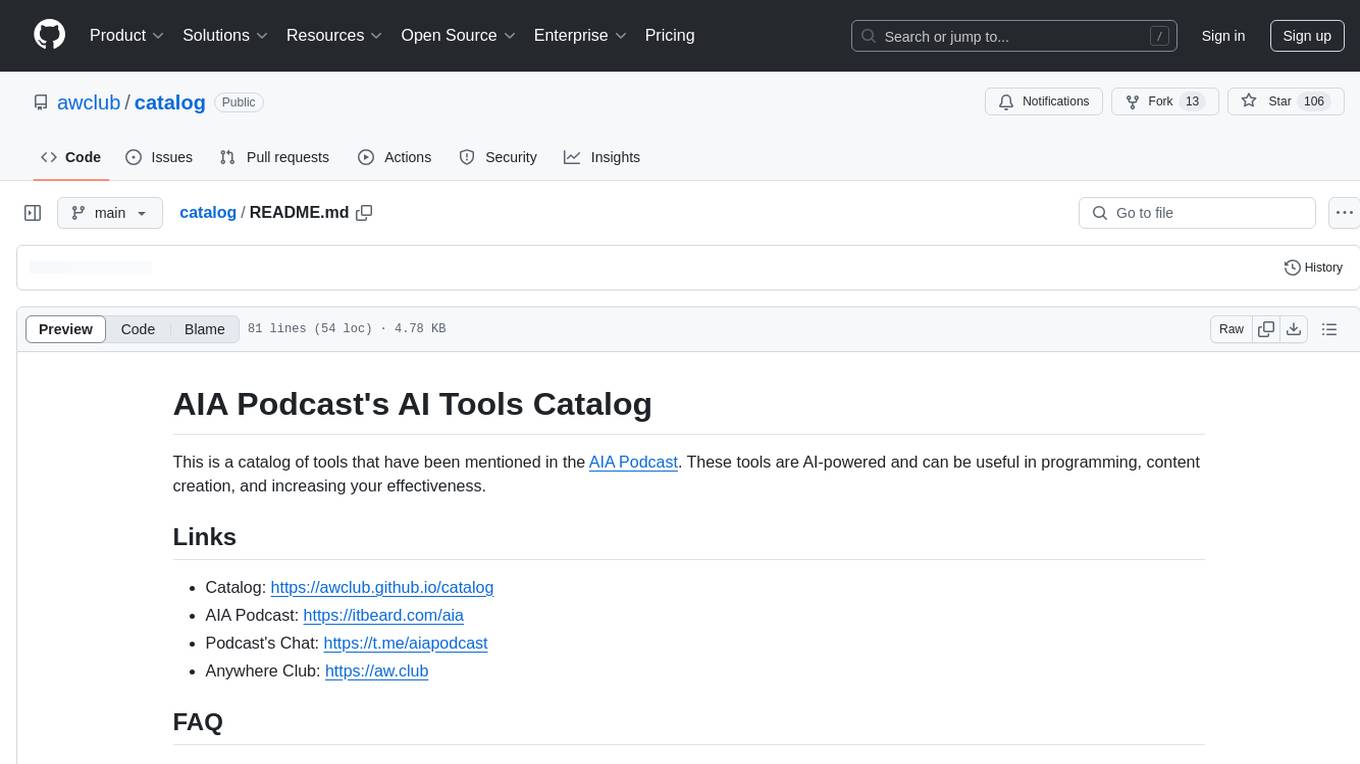
AIA Podcast's AI Tools Catalog is a collection of AI-powered tools mentioned in the podcast. These tools can be beneficial for programming, content creation, and enhancing productivity. To contribute, users can add services by providing a brief description in the Telegram chat or suggest improvements by forking the repository and submitting a PR. Users can also report closed or inoperative tools through the creation of an Issue. The catalog is a valuable resource for discovering innovative AI tools and services.
README:
This is a catalog of tools that have been mentioned in the AIA Podcast. These tools are AI-powered and can be useful in programming, content creation, and increasing your effectiveness.
- Catalog: https://awclub.github.io/catalog
- AIA Podcast: https://itbeard.com/aia
- Podcast's Chat: https://t.me/aiapodcast
- Anywhere Club: https://aw.club
Visit our chat on Telegram (RU lang) and send us the link to your service with a short description. If your service is helpful and interesting enough, we will discuss it in the next episode of the AIA Podcast and then add it to our catalog. This is the only way to get into this catalog.
Make a fork of this repository, then make improvements and send a PR (Pull Request) to our repository. Alternatively, you can create an Issue with type "Feature request", and we will implement them if we decide that they are acceptable and meaningful.
You can create an Issue with type "Сlosed or inoperative tool report". Then, we will review the tool and decide whether to remove it from the catalog or not.
Это каталог ИИ-сервисов и инструментов, которые упоминались в AIA Podcast. Эти инструменты работают на основе искусственного интеллекта и могут быть полезны в программировании, создании контента и повышении эффективности вашей работы.
- Каталок: https://awclub.github.io/catalog
- AIA Podcast: https://itbeard.com/aia
- Чат подкаста: https://t.me/aiapodcast
- Anywhere Club: https://aw.club
Зайдите в наш чат в Telegram и пришлите нам ссылку на сервис с кратким описанием. Если сервис окажется достаточно полезным и интересным, мы обсудим его в следующем эпизоде AIA Podcast, а затем добавим в наш каталог. Это единственный способ попасть в каталог.
Сделайте форк этого репозитория, затем внесите улучшения и отправьте PR (Pull Request) в наш репозиторий. Также вы можете создать Issue с типом "Feature request" и описанием улучшения, мы рассмотрим его и внедрим, если решим, что оно приемлемо и имеет смысл.
Вы можете создать Issue с типом "Сlosed or inoperative tool report". Затем мы рассмотрим запрос и решим, удалять сервис из каталога или нет.
- The catalogue runs on
Vue 3, so you need to prepare your local environment. - We use ESLint for linting.
- The database file is located at the path:
public/db.json
- VSCode
- Volar Extension (also you need to disable Vetur, if you are using it)
- TypeScript Vue Plugin.
If you need to change the settings, see the Vite Configuration Reference.
npm installnpm run devnpm run buildFor Tasks:
Click tags to check more tools for each tasksFor Jobs:
Alternative AI tools for catalog
Similar Open Source Tools

catalog
AIA Podcast's AI Tools Catalog is a collection of AI-powered tools mentioned in the podcast. These tools can be beneficial for programming, content creation, and enhancing productivity. To contribute, users can add services by providing a brief description in the Telegram chat or suggest improvements by forking the repository and submitting a PR. Users can also report closed or inoperative tools through the creation of an Issue. The catalog is a valuable resource for discovering innovative AI tools and services.
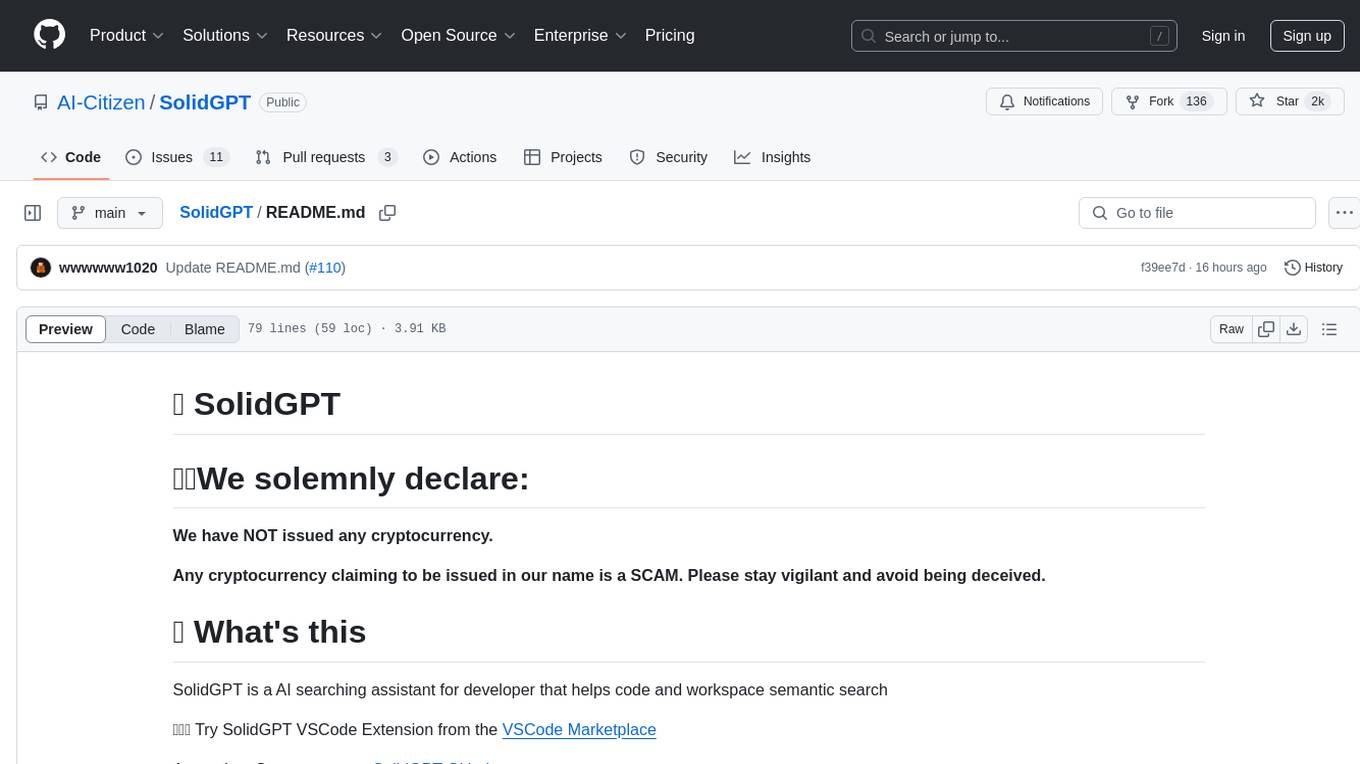
SolidGPT
SolidGPT is an AI searching assistant for developers that helps with code and workspace semantic search. It provides features such as talking to your codebase, asking questions about your codebase, semantic search and summary in Notion, and getting questions answered from your codebase and Notion without context switching. The tool ensures data safety by not collecting users' data and uses the OpenAI series model API.
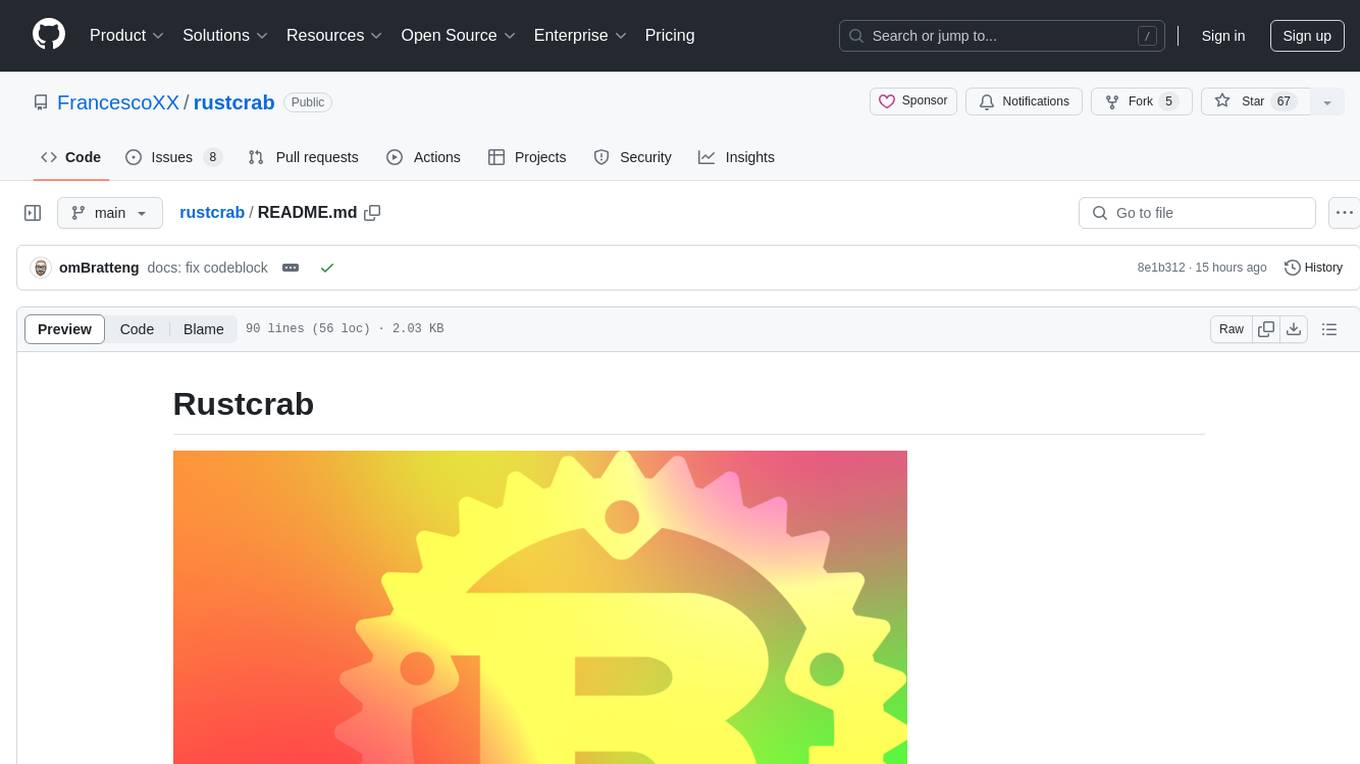
rustcrab
Rustcrab is a repository for Rust developers, offering resources, tools, and guides to enhance Rust programming skills. It is a Next.js application with Tailwind CSS and TypeScript, featuring real-time display of GitHub stars, light/dark mode toggling, integration with daily.dev, and social media links. Users can clone the repository, install dependencies, run the development server, build for production, and deploy to various platforms. Contributions are encouraged through opening issues or submitting pull requests.
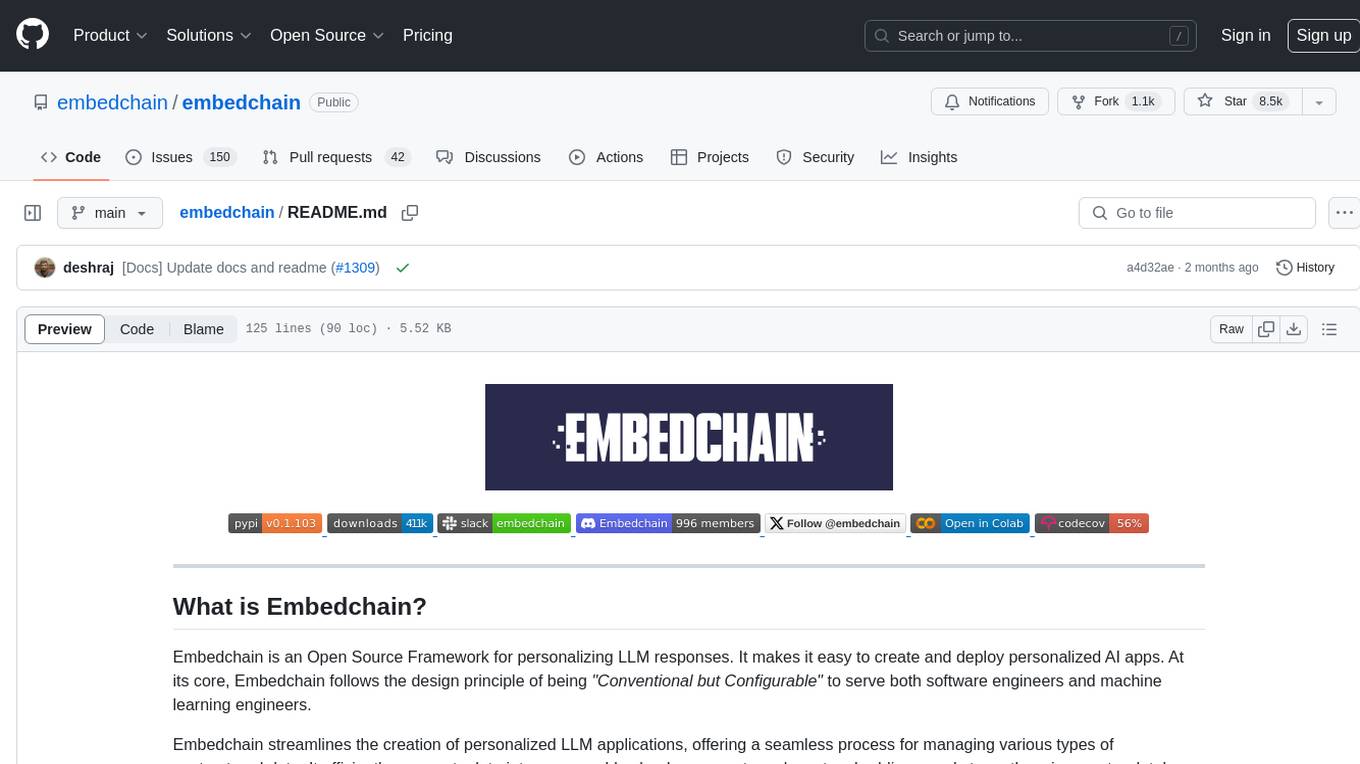
embedchain
Embedchain is an Open Source Framework for personalizing LLM responses. It simplifies the creation and deployment of personalized AI applications by efficiently managing unstructured data, generating relevant embeddings, and storing them in a vector database. With diverse APIs, users can extract contextual information, find precise answers, and engage in interactive chat conversations tailored to their data. The framework follows the design principle of being 'Conventional but Configurable' to cater to both software engineers and machine learning engineers.
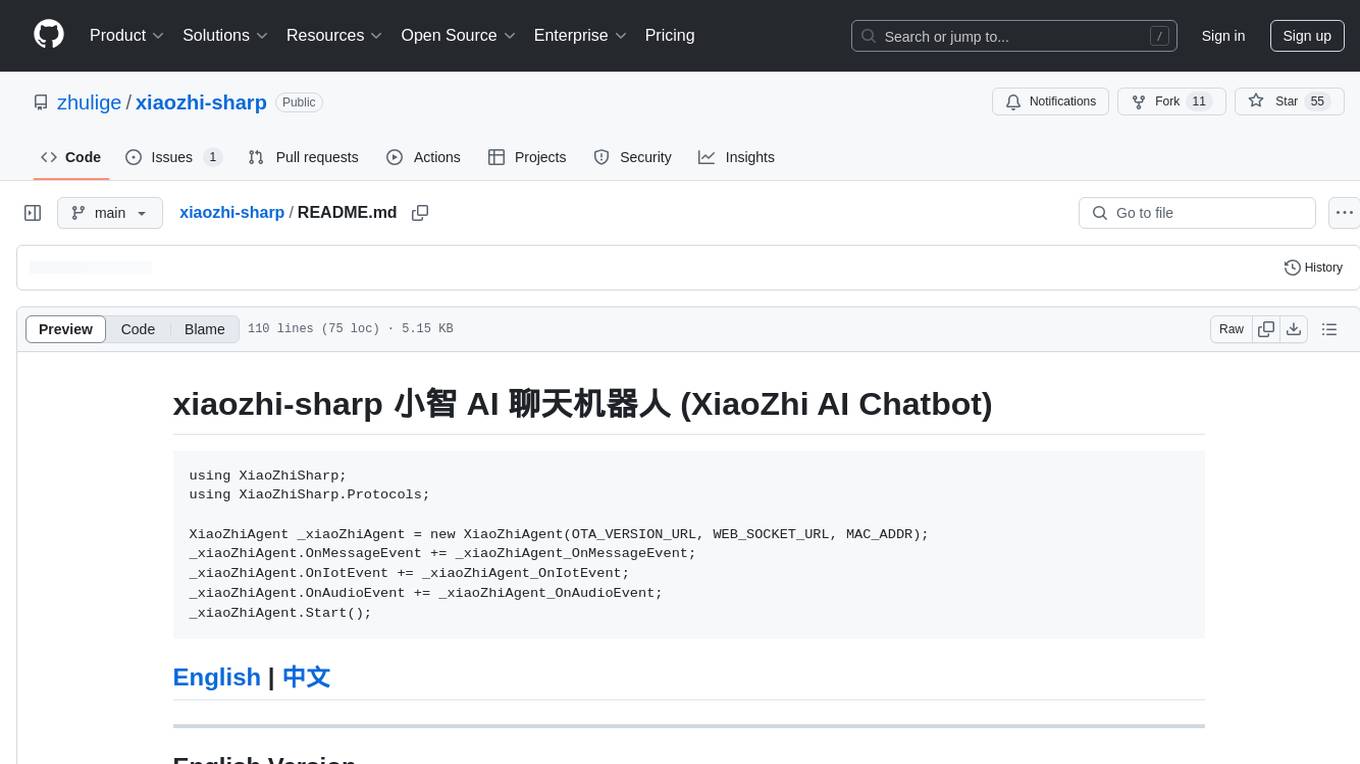
xiaozhi-sharp
xiaozhi-sharp is a meticulously crafted XiaoZhi client in C#, serving as a code learning example and enabling intelligent interaction with XiaoZhi AI without related hardware. It connects to xiaozhi.me server for stable services. The tool includes a debugging feature to understand XiaoZhi's commands and a console client for interaction. Users need .NET Core SDK to run the project smoothly, ensuring stable network connection for optimal usage. Contributions and feedback are welcome for project improvement and community engagement.
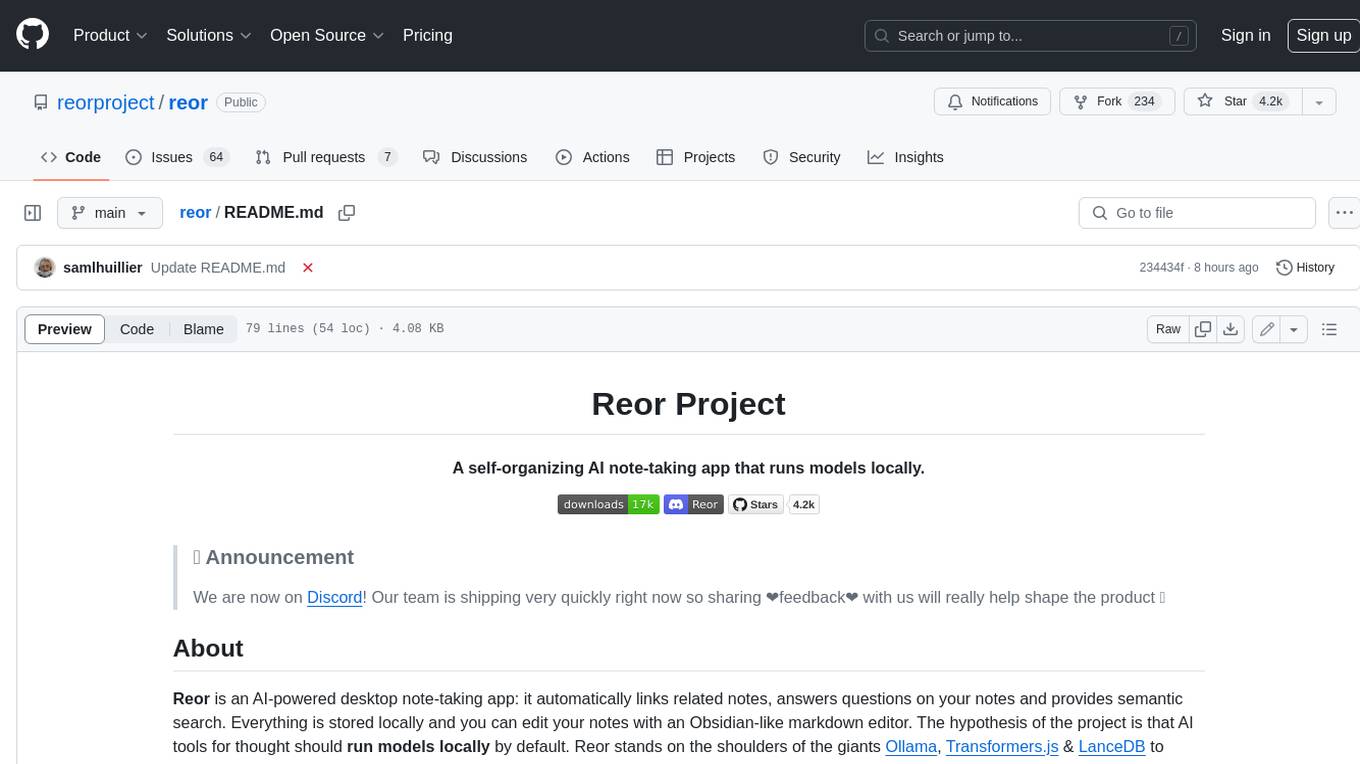
reor
Reor is an AI-powered desktop note-taking app that automatically links related notes, answers questions on your notes, and provides semantic search. Everything is stored locally and you can edit your notes with an Obsidian-like markdown editor. The hypothesis of the project is that AI tools for thought should run models locally by default. Reor stands on the shoulders of the giants Ollama, Transformers.js & LanceDB to enable both LLMs and embedding models to run locally. Connecting to OpenAI or OpenAI-compatible APIs like Oobabooga is also supported.
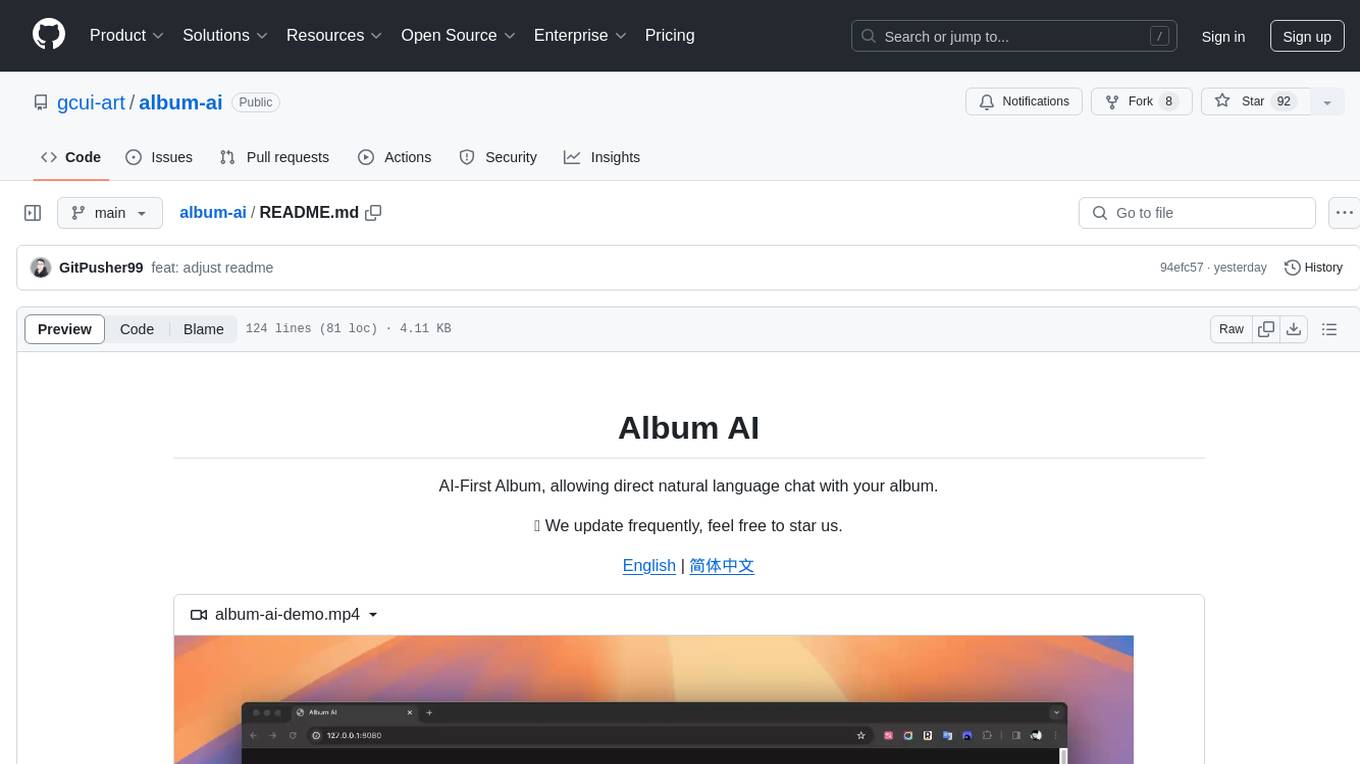
album-ai
Album AI is an experimental project that uses GPT-4o-mini to automatically identify metadata from image files in the album. It leverages RAG technology to enable conversations with the album, serving as a photo album or image knowledge base to assist in content generation. The tool provides APIs for search and chat functionalities, supports one-click deployment to platforms like Render, and allows for integration and modification under a permissive open-source license.

OpenAGI
OpenAGI is an AI agent creation package designed for researchers and developers to create intelligent agents using advanced machine learning techniques. The package provides tools and resources for building and training AI models, enabling users to develop sophisticated AI applications. With a focus on collaboration and community engagement, OpenAGI aims to facilitate the integration of AI technologies into various domains, fostering innovation and knowledge sharing among experts and enthusiasts.
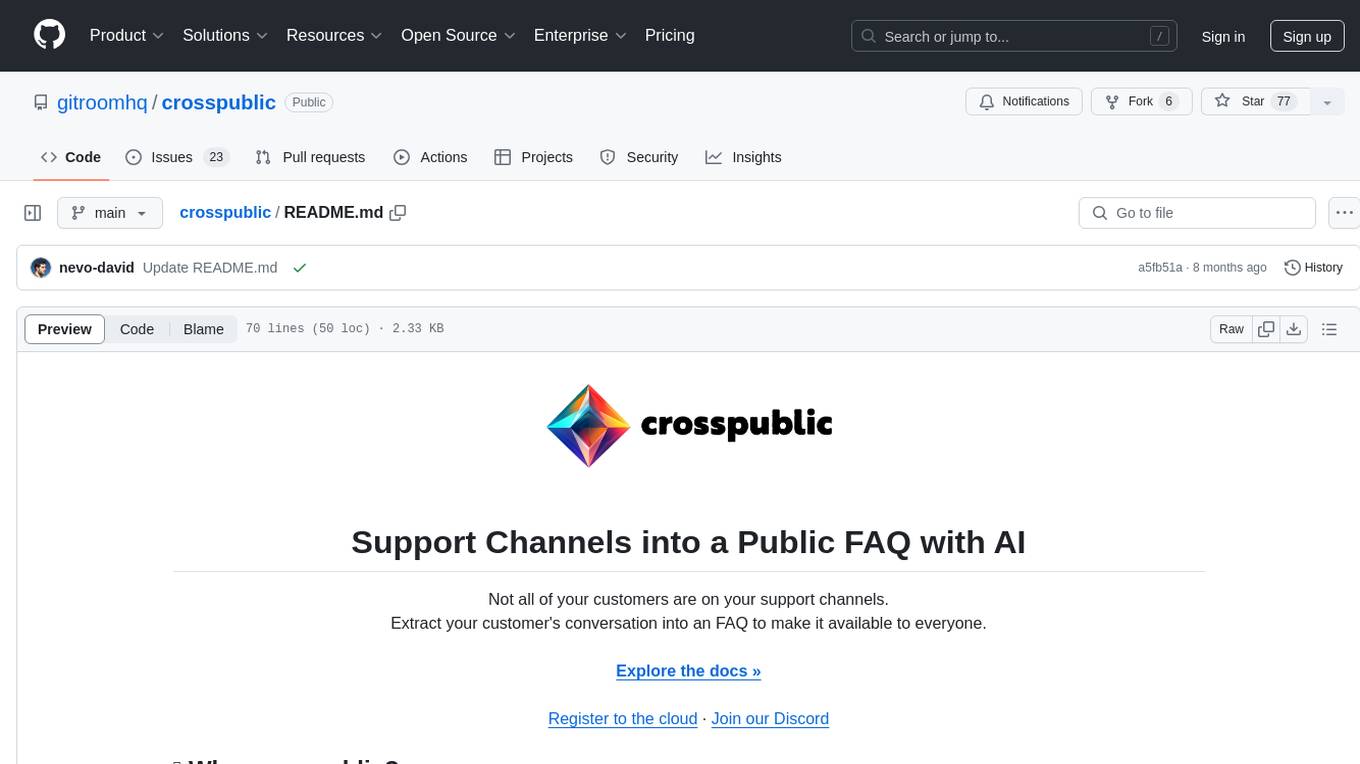
crosspublic
Support Channels into a Public FAQ with AI. Extract customer conversations into an FAQ accessible via public URL. Connects to Discord, converts conversations into FAQ using ChatGPT. Monorepo with NX containing backend, Discord bot, panel, tenants website, marketing website, and documentation. Self-funded project seeking community support.
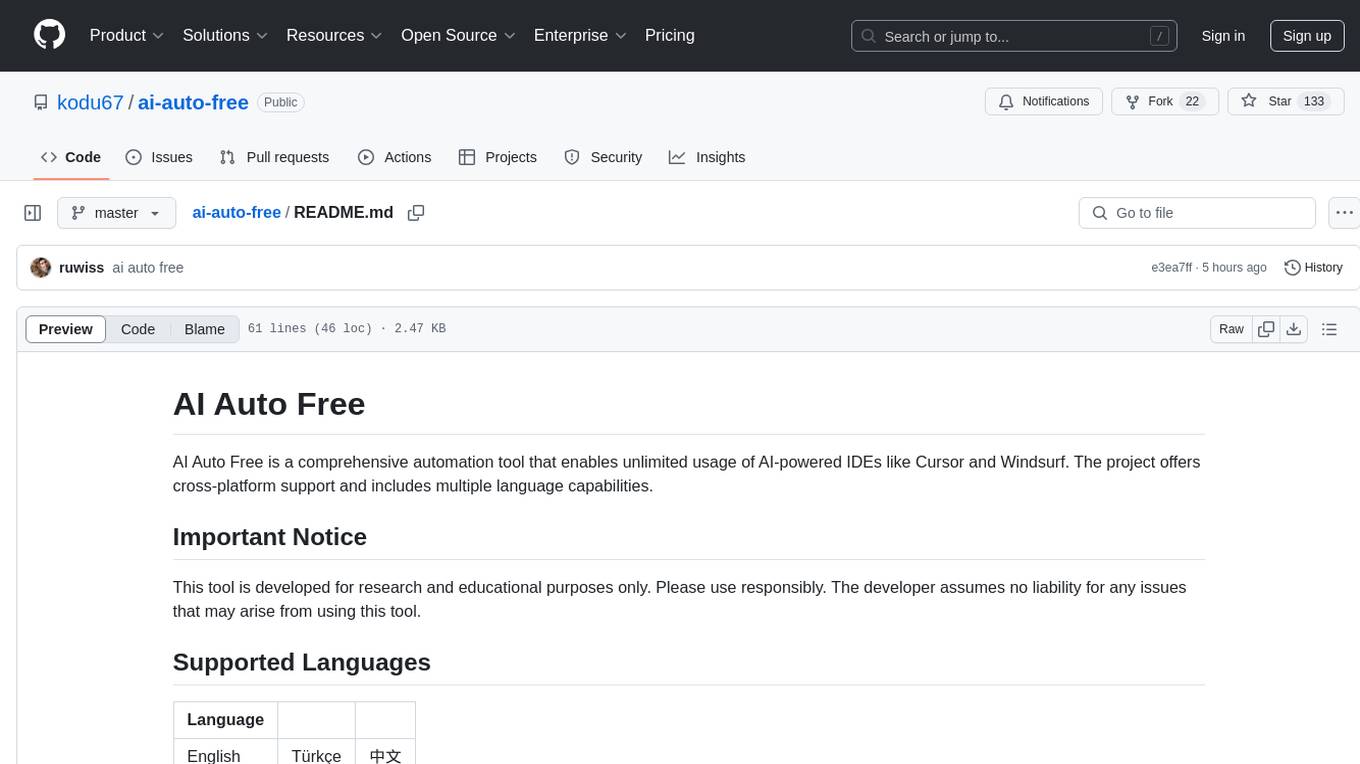
ai-auto-free
AI Auto Free is a comprehensive automation tool that enables unlimited usage of AI-powered IDEs like Cursor and Windsurf. It offers cross-platform support and multiple language capabilities. The tool automates tasks such as account creation and email verification, overcoming trial limits and unauthorized requests. Users can use it for educational and research purposes to enhance their coding experience with AI.
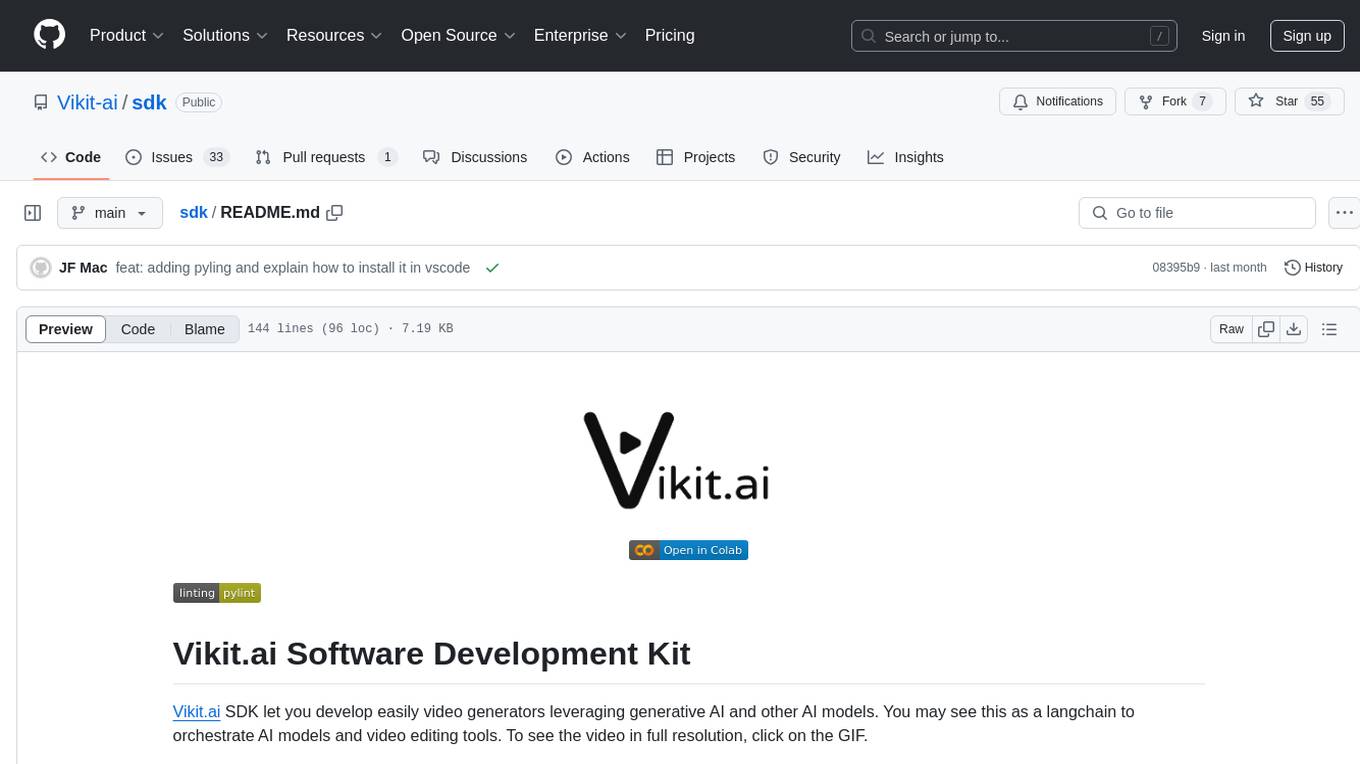
sdk
Vikit.ai SDK is a software development kit that enables easy development of video generators using generative AI and other AI models. It serves as a langchain to orchestrate AI models and video editing tools. The SDK allows users to create videos from text prompts with background music and voice-over narration. It also supports generating composite videos from multiple text prompts. The tool requires Python 3.8+, specific dependencies, and tools like FFMPEG and ImageMagick for certain functionalities. Users can contribute to the project by following the contribution guidelines and standards provided.
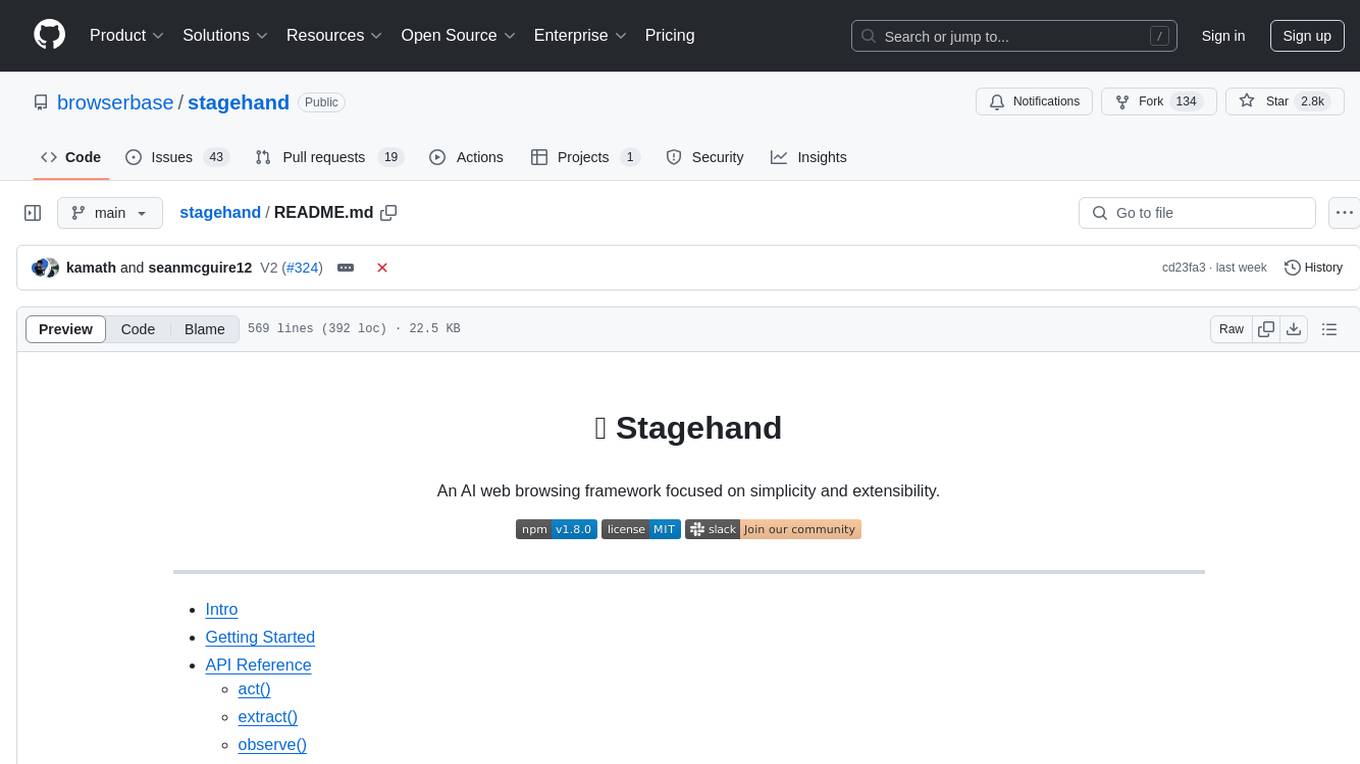
stagehand
Stagehand is an AI web browsing framework that simplifies and extends web automation using three simple APIs: act, extract, and observe. It aims to provide a lightweight, configurable framework without complex abstractions, allowing users to automate web tasks reliably. The tool generates Playwright code based on atomic instructions provided by the user, enabling natural language-driven web automation. Stagehand is open source, maintained by the Browserbase team, and supports different models and model providers for flexibility in automation tasks.
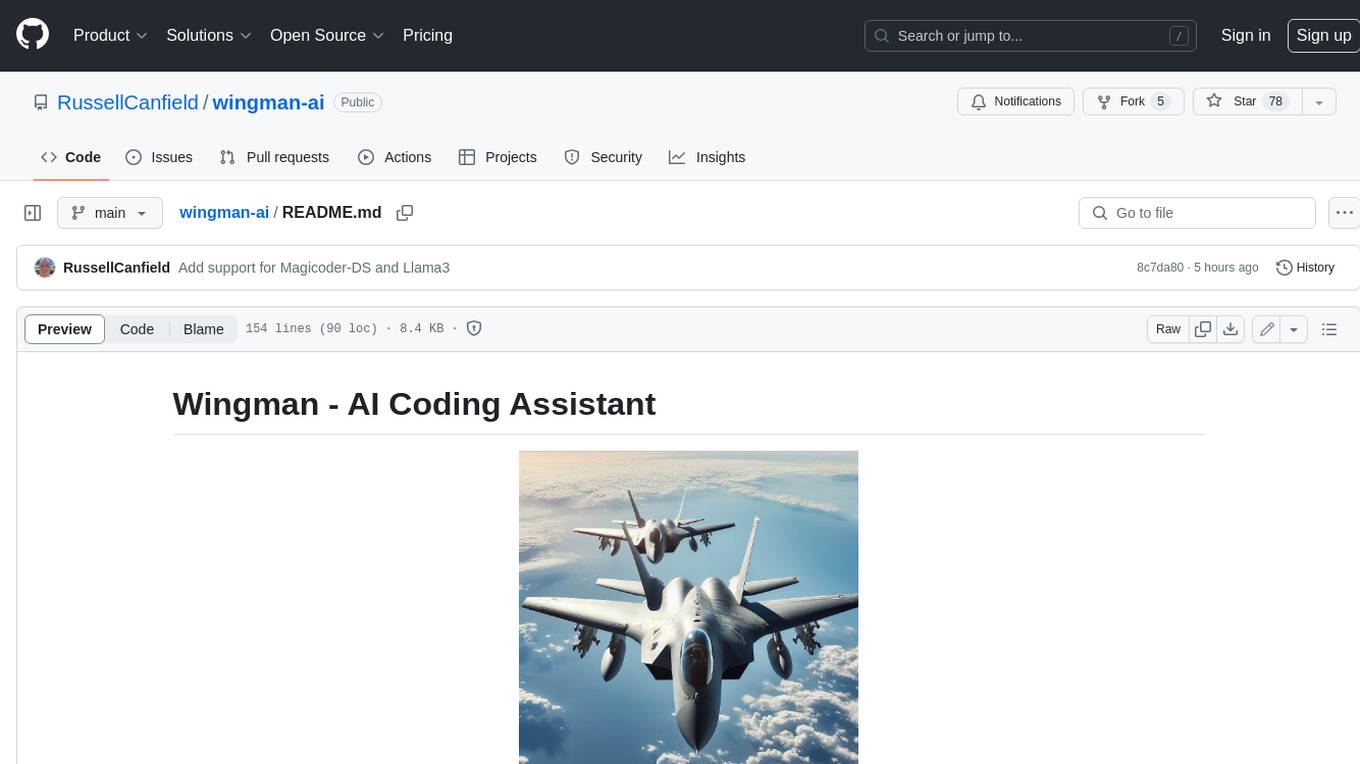
wingman-ai
Wingman-AI is a free and open-source AI coding assistant that brings high-quality AI-assisted coding right to your computer. It offers features such as code completion, interactive chat, and support for multiple AI providers, including Ollama, Hugging Face, and OpenAI. Wingman-AI is designed to enhance your coding workflow by providing real-time assistance and suggestions, making it an ideal tool for developers of all levels.
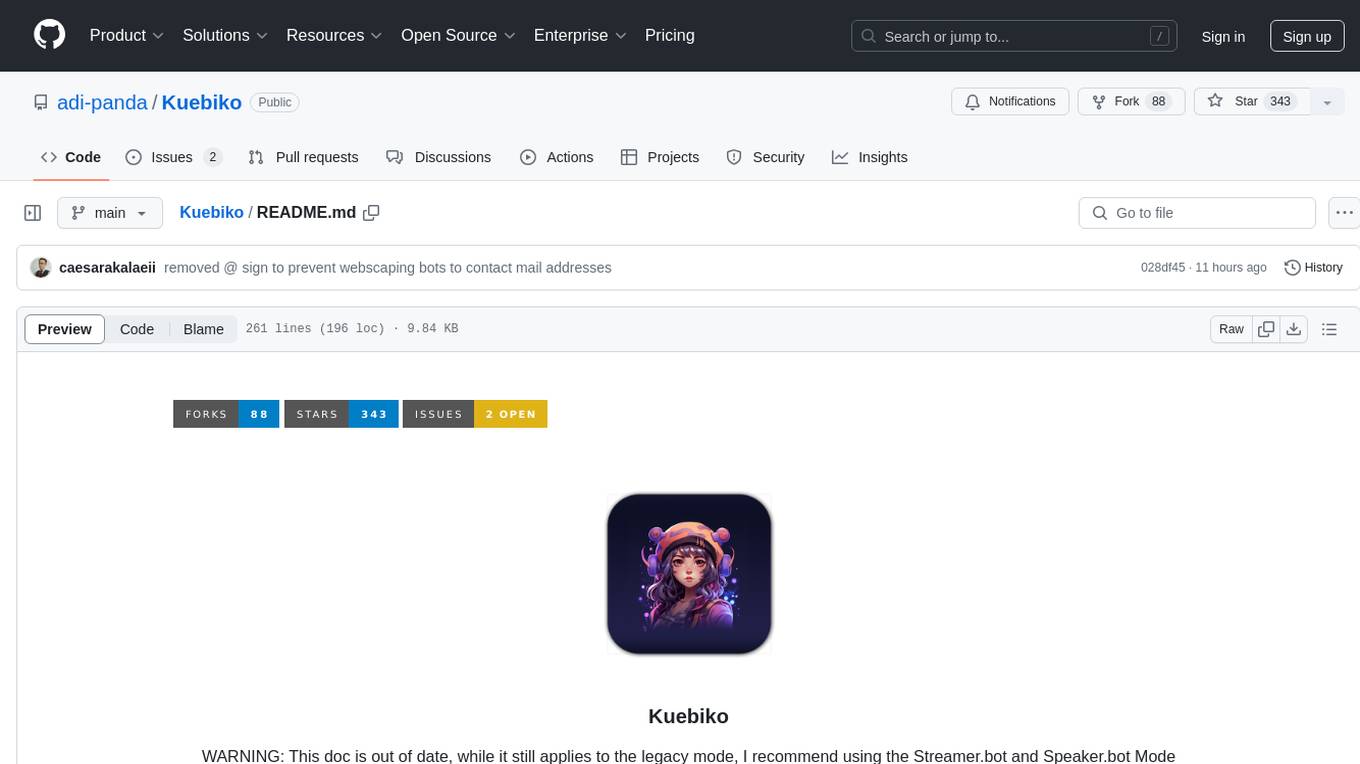
Kuebiko
Kuebiko is a Twitch Chat Bot that reads twitch chat and generates text-to-speech responses using Google Cloud API and OpenAI's GPT-3 text completion model. It allows users to set up their own VTuber AI similar to 'Neuro-Sama'. The project is built with Python and requires setting up various API keys and configurations to enable the bot functionality. Users can customize the voice of their VTuber and route audio using VBAudio Cable. Kuebiko provides a unique way to interact with viewers through chat responses and captions in OBS.
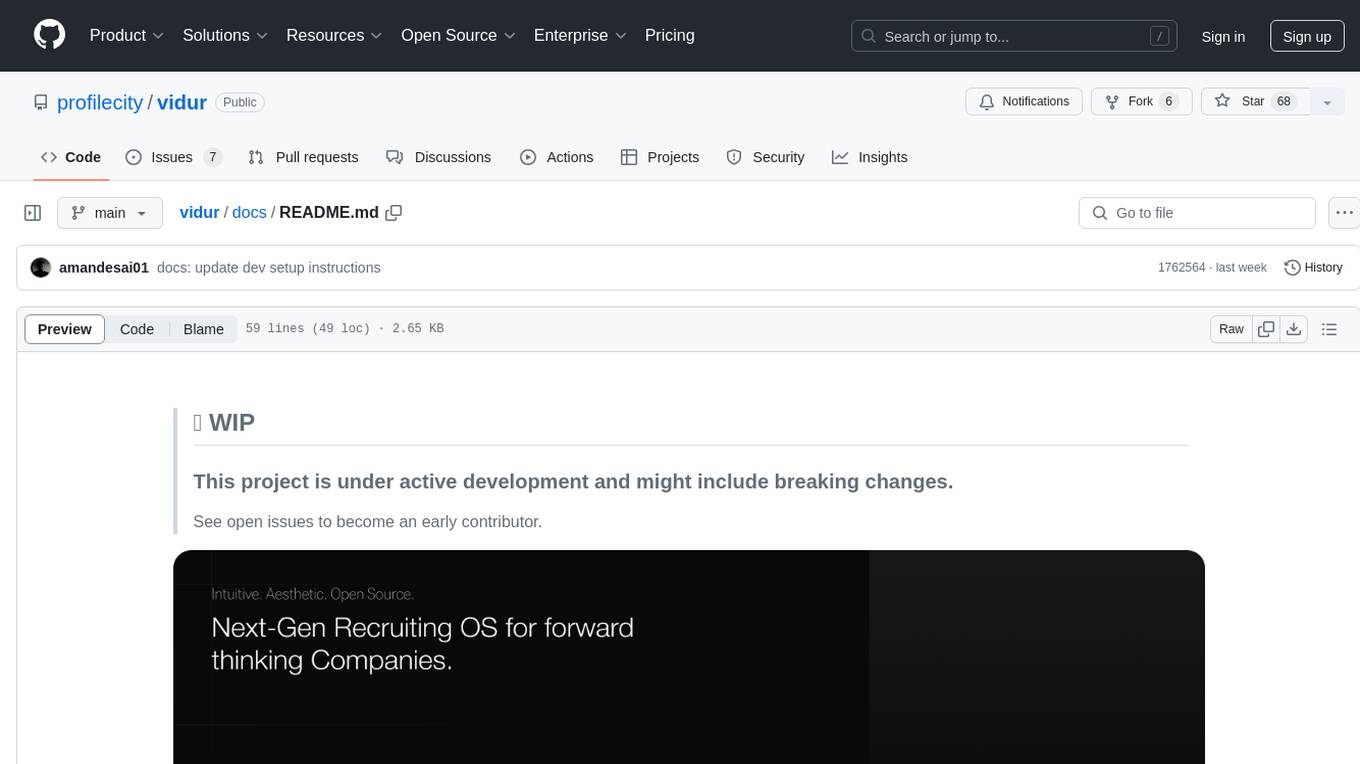
vidur
Vidur is an open-source next-gen Recruiting OS that offers an intuitive and modern interface for forward-thinking companies to efficiently manage their recruitment processes. It combines advanced candidate profiles, team workspace, plugins, and one-click apply features. The project is under active development, and contributors are welcome to join by addressing open issues. To ensure privacy, security issues should be reported via email to [email protected].
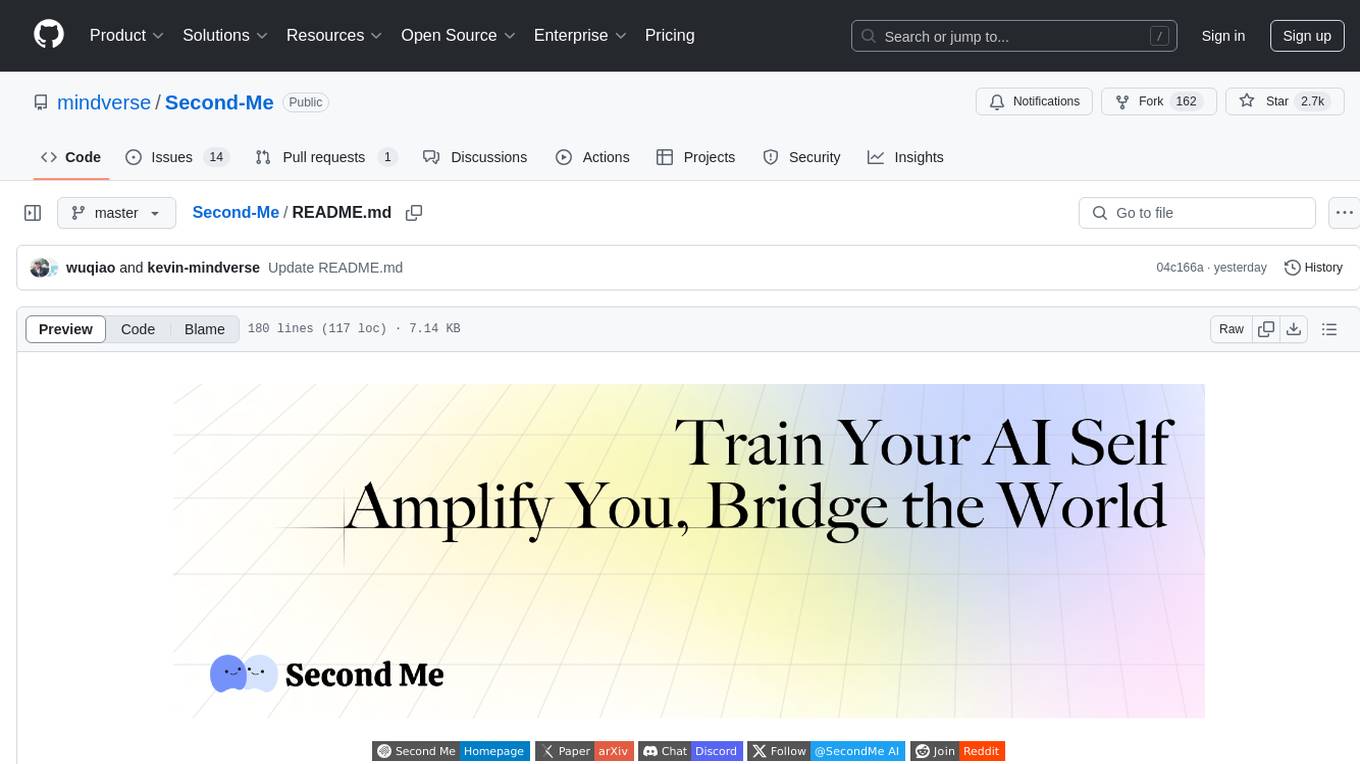
Second-Me
Second Me is an open-source prototype that allows users to craft their own AI self, preserving their identity, context, and interests. It is locally trained and hosted, yet globally connected, scaling intelligence across an AI network. It serves as an AI identity interface, fostering collaboration among AI selves and enabling the development of native AI apps. The tool prioritizes individuality and privacy, ensuring that user information and intelligence remain local and completely private.
For similar tasks

catalog
AIA Podcast's AI Tools Catalog is a collection of AI-powered tools mentioned in the podcast. These tools can be beneficial for programming, content creation, and enhancing productivity. To contribute, users can add services by providing a brief description in the Telegram chat or suggest improvements by forking the repository and submitting a PR. Users can also report closed or inoperative tools through the creation of an Issue. The catalog is a valuable resource for discovering innovative AI tools and services.
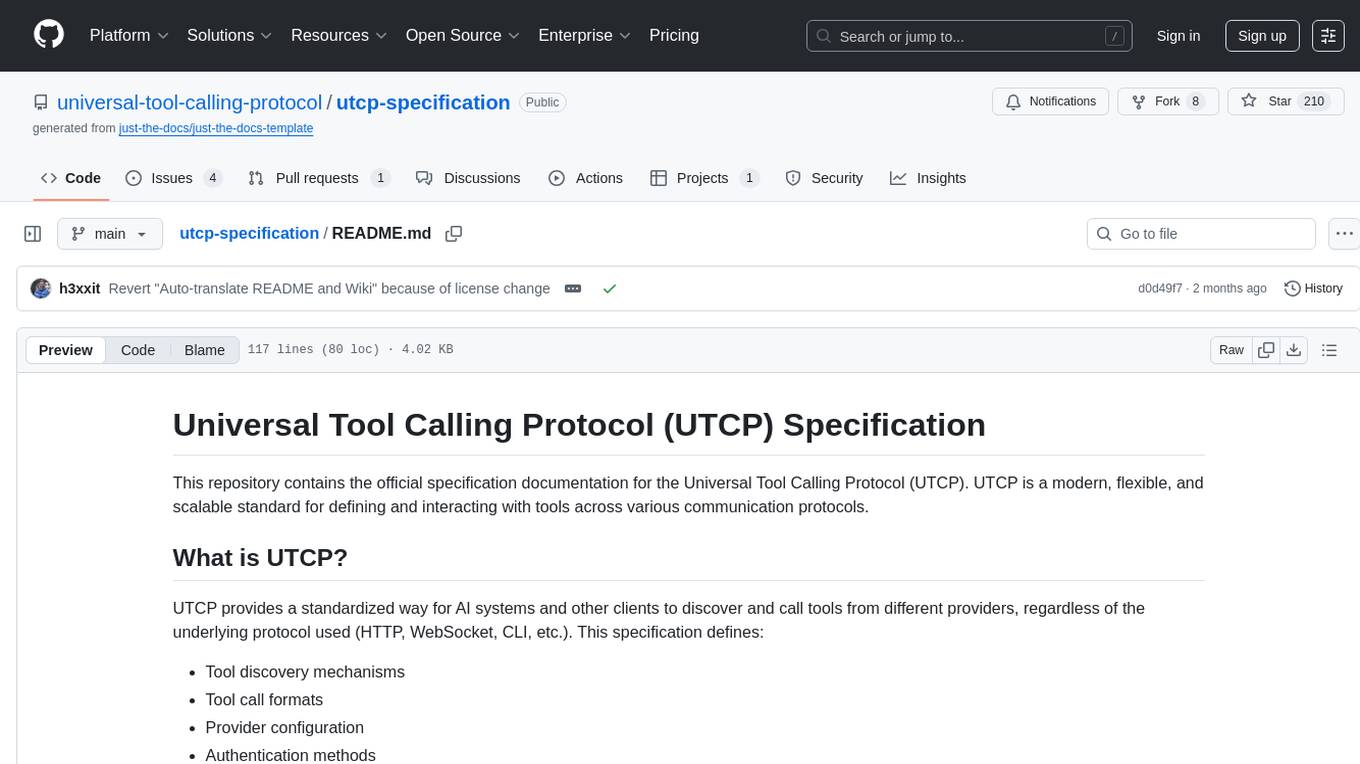
utcp-specification
The Universal Tool Calling Protocol (UTCP) Specification repository contains the official documentation for a modern and scalable standard that enables AI systems and clients to discover and interact with tools across different communication protocols. It defines tool discovery mechanisms, call formats, provider configuration, authentication methods, and response handling.

devchat
DevChat is an open-source workflow engine that enables developers to create intelligent, automated workflows for engaging with users through a chat panel within their IDEs. It combines script writing flexibility, latest AI models, and an intuitive chat GUI to enhance user experience and productivity. DevChat simplifies the integration of AI in software development, unlocking new possibilities for developers.
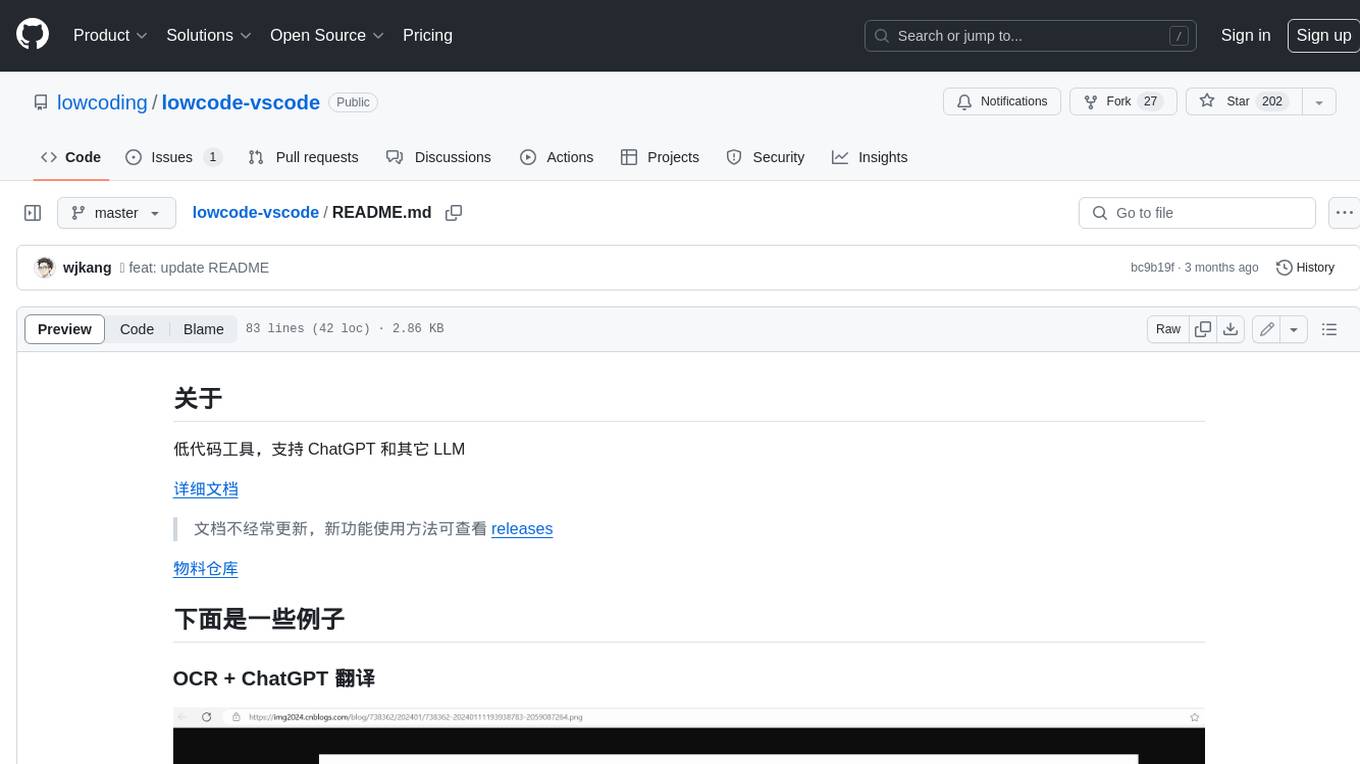
lowcode-vscode
This repository is a low-code tool that supports ChatGPT and other LLM models. It provides functionalities such as OCR translation, generating specified format JSON, translating Chinese to camel case, translating current directory to English, and quickly creating code templates. Users can also generate CURD operations for managing backend list pages. The tool allows users to select templates, initialize query form configurations using OCR, initialize table configurations using OCR, translate Chinese fields using ChatGPT, and generate code without writing a single line. It aims to enhance productivity by simplifying code generation and development processes.
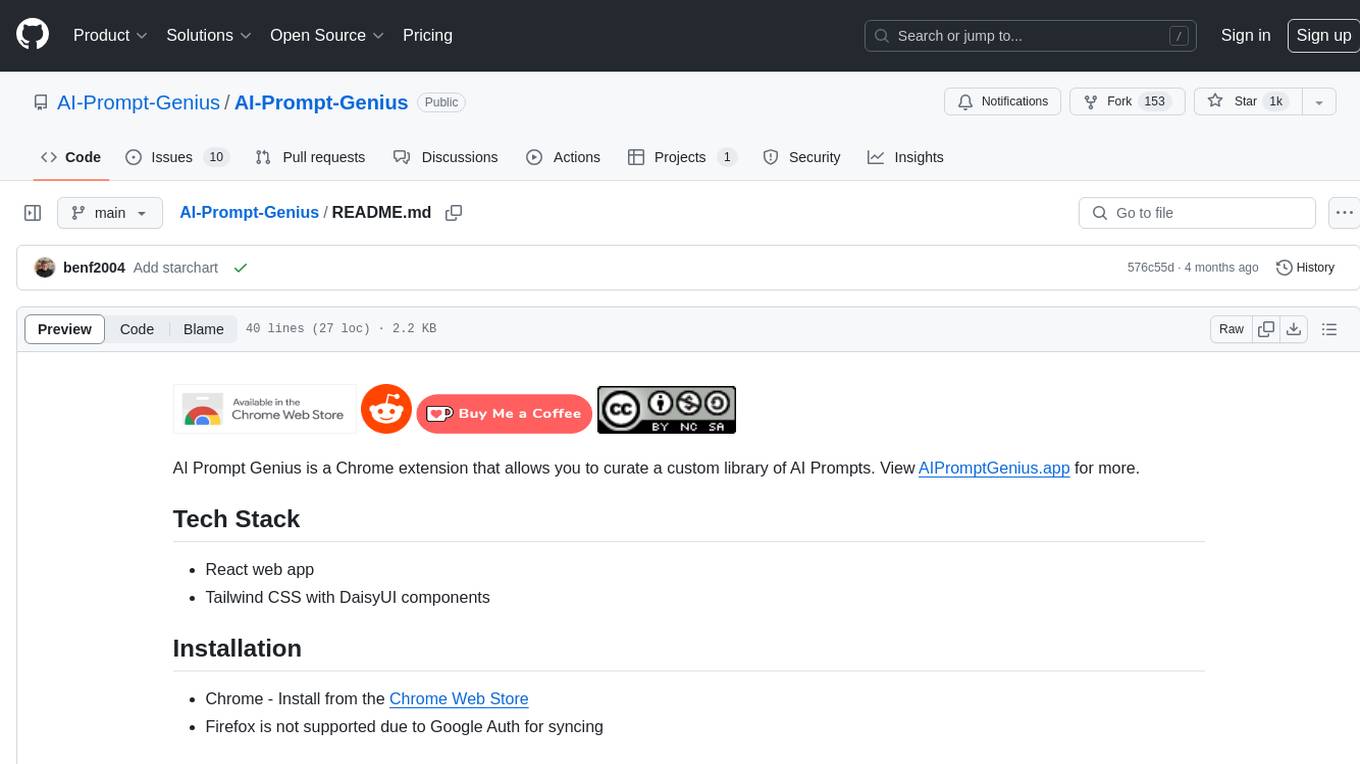
AI-Prompt-Genius
AI Prompt Genius is a Chrome extension that allows you to curate a custom library of AI prompts. It is built using React web app and Tailwind CSS with DaisyUI components. The extension enables users to create and manage AI prompts for various purposes. It provides a user-friendly interface for organizing and accessing AI prompts efficiently. AI Prompt Genius is designed to enhance productivity and creativity by offering a personalized collection of prompts tailored to individual needs. Users can easily install the extension from the Chrome Web Store and start using it to generate AI prompts for different tasks.
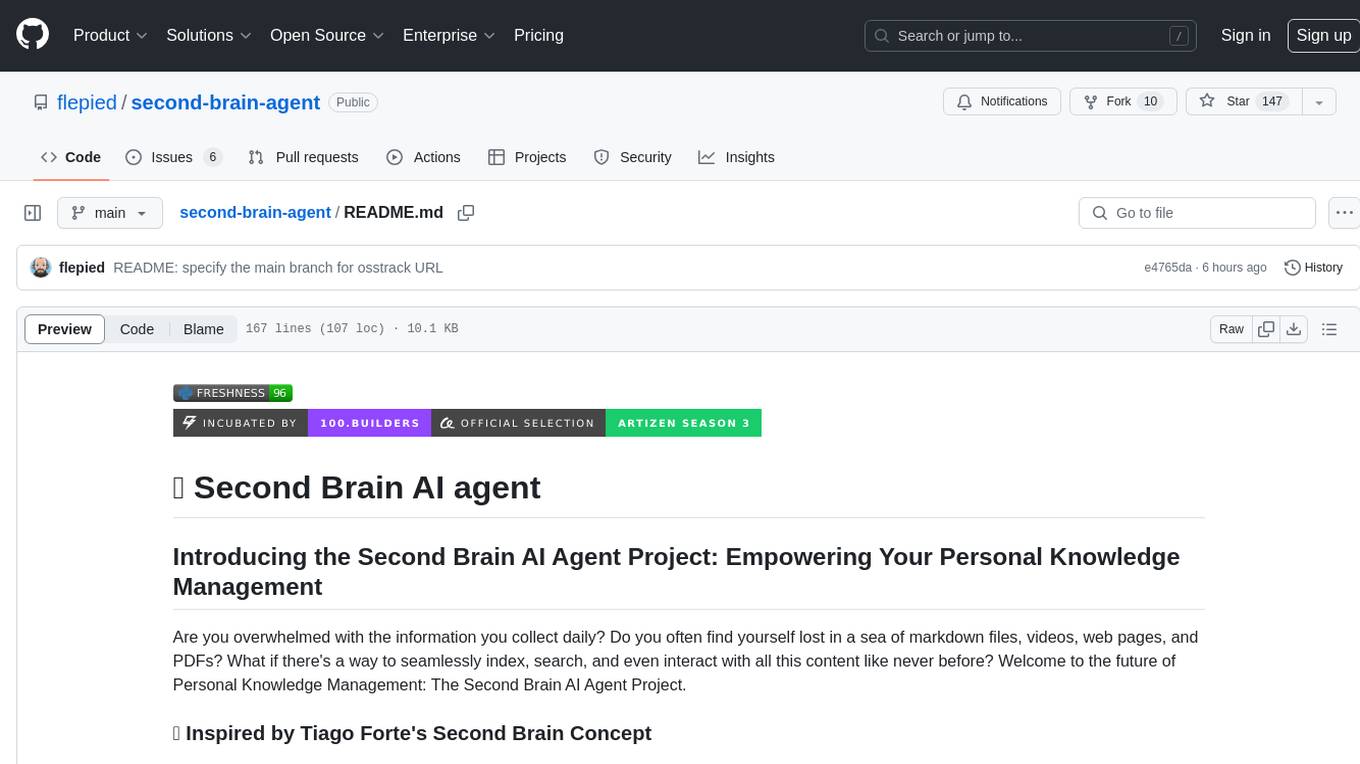
second-brain-agent
The Second Brain AI Agent Project is a tool designed to empower personal knowledge management by automatically indexing markdown files and links, providing a smart search engine powered by OpenAI, integrating seamlessly with different note-taking methods, and enhancing productivity by accessing information efficiently. The system is built on LangChain framework and ChromaDB vector store, utilizing a pipeline to process markdown files and extract text and links for indexing. It employs a Retrieval-augmented generation (RAG) process to provide context for asking questions to the large language model. The tool is beneficial for professionals, students, researchers, and creatives looking to streamline workflows, improve study sessions, delve deep into research, and organize thoughts and ideas effortlessly.
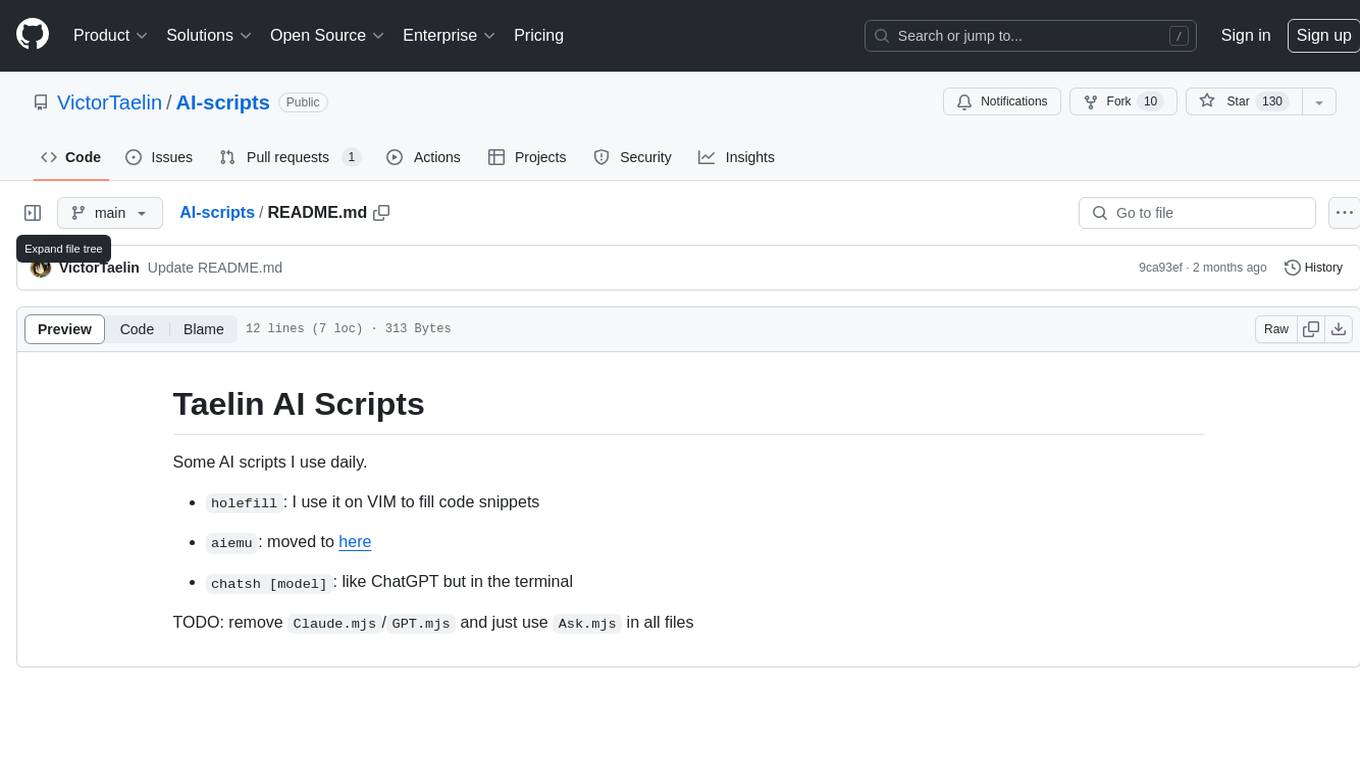
AI-scripts
AI-scripts is a repository containing various AI scripts used for daily tasks. It includes tools like 'holefill' for filling code snippets in VIM, 'aiemu' for emulation purposes, and 'chatsh [model]' for terminal-based ChatGPT functionality. The repository aims to streamline AI-related workflows and enhance productivity by providing convenient scripts for common tasks.
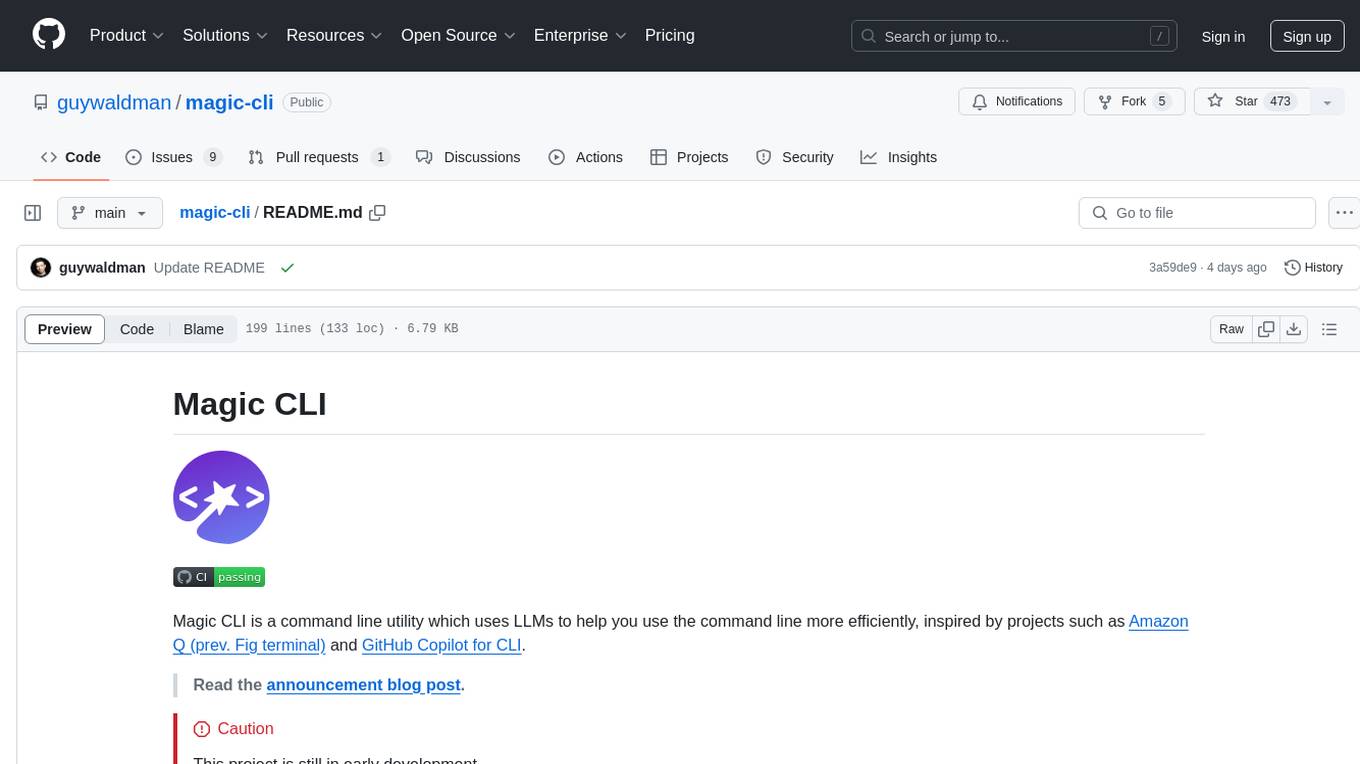
magic-cli
Magic CLI is a command line utility that leverages Large Language Models (LLMs) to enhance command line efficiency. It is inspired by projects like Amazon Q and GitHub Copilot for CLI. The tool allows users to suggest commands, search across command history, and generate commands for specific tasks using local or remote LLM providers. Magic CLI also provides configuration options for LLM selection and response generation. The project is still in early development, so users should expect breaking changes and bugs.
For similar jobs

sweep
Sweep is an AI junior developer that turns bugs and feature requests into code changes. It automatically handles developer experience improvements like adding type hints and improving test coverage.

teams-ai
The Teams AI Library is a software development kit (SDK) that helps developers create bots that can interact with Teams and Microsoft 365 applications. It is built on top of the Bot Framework SDK and simplifies the process of developing bots that interact with Teams' artificial intelligence capabilities. The SDK is available for JavaScript/TypeScript, .NET, and Python.

ai-guide
This guide is dedicated to Large Language Models (LLMs) that you can run on your home computer. It assumes your PC is a lower-end, non-gaming setup.

classifai
Supercharge WordPress Content Workflows and Engagement with Artificial Intelligence. Tap into leading cloud-based services like OpenAI, Microsoft Azure AI, Google Gemini and IBM Watson to augment your WordPress-powered websites. Publish content faster while improving SEO performance and increasing audience engagement. ClassifAI integrates Artificial Intelligence and Machine Learning technologies to lighten your workload and eliminate tedious tasks, giving you more time to create original content that matters.

chatbot-ui
Chatbot UI is an open-source AI chat app that allows users to create and deploy their own AI chatbots. It is easy to use and can be customized to fit any need. Chatbot UI is perfect for businesses, developers, and anyone who wants to create a chatbot.

BricksLLM
BricksLLM is a cloud native AI gateway written in Go. Currently, it provides native support for OpenAI, Anthropic, Azure OpenAI and vLLM. BricksLLM aims to provide enterprise level infrastructure that can power any LLM production use cases. Here are some use cases for BricksLLM: * Set LLM usage limits for users on different pricing tiers * Track LLM usage on a per user and per organization basis * Block or redact requests containing PIIs * Improve LLM reliability with failovers, retries and caching * Distribute API keys with rate limits and cost limits for internal development/production use cases * Distribute API keys with rate limits and cost limits for students

uAgents
uAgents is a Python library developed by Fetch.ai that allows for the creation of autonomous AI agents. These agents can perform various tasks on a schedule or take action on various events. uAgents are easy to create and manage, and they are connected to a fast-growing network of other uAgents. They are also secure, with cryptographically secured messages and wallets.

griptape
Griptape is a modular Python framework for building AI-powered applications that securely connect to your enterprise data and APIs. It offers developers the ability to maintain control and flexibility at every step. Griptape's core components include Structures (Agents, Pipelines, and Workflows), Tasks, Tools, Memory (Conversation Memory, Task Memory, and Meta Memory), Drivers (Prompt and Embedding Drivers, Vector Store Drivers, Image Generation Drivers, Image Query Drivers, SQL Drivers, Web Scraper Drivers, and Conversation Memory Drivers), Engines (Query Engines, Extraction Engines, Summary Engines, Image Generation Engines, and Image Query Engines), and additional components (Rulesets, Loaders, Artifacts, Chunkers, and Tokenizers). Griptape enables developers to create AI-powered applications with ease and efficiency.